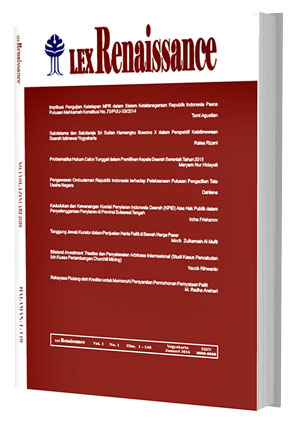Main Article Content
Abstract
Keywords
Article Details
Authors who publish with this journal agree to the following terms:
a. Authors retain copyright and grant the journal right of first publication with the work simultaneously licensed under a Creative Commons Attribution License that allows others to share the work with an acknowledgement of the work's authorship and initial publication in this journal.
b. Authors are able to enter into separate, additional contractual arrangements for the non-exclusive distribution of the journal's published version of the work (e.g., post it to an institutional repository or publish it in a book), with an acknowledgement of its initial publication in this journal.
c. Authors are permitted and encouraged to post their work online (e.g., in institutional repositories or on their website) prior to and during the submission process, as it can lead to productive exchanges, as well as earlier and greater citation of published work (See The Effect of Open Access).References
- Buku
- Budiono, Herlien, Notaris dan Kode Etiknya, Disampaikan pada Upgrading dan Refreshing Course Nasional Ikatan Notaris Indonesia, Ikatan Notaris Indonesia, Medan, 2007.
- Ibrahim, Johnny, Teori dan Metodologi Penelitian Hukum Normatif, Cetakan Keempat, Banyumedia, Jakarta, 2008.
- Lumban Tobing, G.H.S., Peraturan Jabatan Notaris, Erlangga, Jakarta, 1983.
- Luthfan Hadi Darus, Muhammad, Hukum Notariat dan Tanggungjawab Jabatan Notaris, Cetakan Pertama, UII Press, Yogyakarta, 2017.
- M. Hadjon, Philipus dan Tatiek Sri Djatmiati, Argumentasi Hukum, Gadjah Mada University Press, Yogyakarta, 2005.
- Mahmud Marzuki, Peter, Penelitian Hukum, Cetakan Keduabelas, Prenadamedia Group, Jakarta, 2016.
- Marzuki, Suparman, Etika dan Kode Etik Profesi Hukum, Cetakan Pertama, FH UII Press, Yogyakrta, 2017.
- Subekti, R. dan R. Tjitrosudibio, Kitab Undang-Undang Hukum Perdata, PT. Pradnya Paramita, Jakarta, 2009.
- Peraturan Perundang-undangan
- Kitab Undang-undang Hukum Pidana.
- Kitab Undang-Undang Hukum Perdata.
- Undang-Undang Nomor 5 Tahun 1986 tentang Peradilan Tata Usaha Negara.
- Undang-Undang Nomor 4 Tahun 1996 tentang Hak Tanggungan Atas Tanah Beserta Benda-Benda yang Berkaitan Dengan Tanah.
- Undang-Undang Nomor 2 Tahun 2014 tentang Perubahan Atas Undang-Undang Nomor 30 Tahun 2004 tentang Jabatan Notaris.
- Peraturan Pemerintah Republik Indonesia Nomor 24 Tahun 2016 tentang Perubahan Atas Peraturan Pemerintah Nomor 37 Tahun 1998 tentang Peraturan Jabatan Pejabat Pembuat Akta Tanah.
- Peraturan Menteri Hukum dan HAM Republik Indonesia Nomor M.02.PR.08.10 Tahun 2004 tentang Tata Cara Pengangkatan Anggota, Pemberhentian Anggota, Susunan Organisasi, Tata Kerja, dan Tata Cara Pemeriksaan Majelis Pengawas.
- Keputusan Menteri Keuangan Republik Indonesia Nomor 338/KMK.01/2000 tentang Pejabat Lelang.
- Kode Etik Notaris Ikatan Notaris Indonesia.
- Tesis dan Jurnal
- Otong Satyagraha, “Aspek Hukum Kekuatan Pembuktian Akta Otentik di Pengadilan (Studi Kasus Putusan Pengadilan Nomor: 158/Pdt.G/2015/Pn.Smn)”, Tesis, Dalam https://dspace.uii.ac.id/ bitstream/handle/123456789/11386/THESIS.pdf?sequence=1&isAllowed=y, Akses 5 Januari 2020.
- Sita Arini Umbas, “Kedudukan Akta Di Bawahtangan Yang Telah Dilegalisasi Notaris Dalam Pembuktian Di Pengadilan”, Tesis, dalam https://media.neliti.com/media/publications/148712-ID-kedudukan-akta-di-bawah-tangan-yang-tela.pdf, Akses 5 Januari 2020.
- Philipus M. Hadjon, “Tentang Wewenang Pemerintahan (Bestuursbevoegdheid)”, Jurnal, Pro Justicia, Fakultas Hukum Universitas Parahyangan Bandung Tahun XVI Nomor 1, Januari 1998.
- Data Elektronik:
- https://wetten.overheid.nl/BWBR0010388/2020-01-01, Akses 16 April 2020.
References
Buku
Budiono, Herlien, Notaris dan Kode Etiknya, Disampaikan pada Upgrading dan Refreshing Course Nasional Ikatan Notaris Indonesia, Ikatan Notaris Indonesia, Medan, 2007.
Ibrahim, Johnny, Teori dan Metodologi Penelitian Hukum Normatif, Cetakan Keempat, Banyumedia, Jakarta, 2008.
Lumban Tobing, G.H.S., Peraturan Jabatan Notaris, Erlangga, Jakarta, 1983.
Luthfan Hadi Darus, Muhammad, Hukum Notariat dan Tanggungjawab Jabatan Notaris, Cetakan Pertama, UII Press, Yogyakarta, 2017.
M. Hadjon, Philipus dan Tatiek Sri Djatmiati, Argumentasi Hukum, Gadjah Mada University Press, Yogyakarta, 2005.
Mahmud Marzuki, Peter, Penelitian Hukum, Cetakan Keduabelas, Prenadamedia Group, Jakarta, 2016.
Marzuki, Suparman, Etika dan Kode Etik Profesi Hukum, Cetakan Pertama, FH UII Press, Yogyakrta, 2017.
Subekti, R. dan R. Tjitrosudibio, Kitab Undang-Undang Hukum Perdata, PT. Pradnya Paramita, Jakarta, 2009.
Peraturan Perundang-undangan
Kitab Undang-undang Hukum Pidana.
Kitab Undang-Undang Hukum Perdata.
Undang-Undang Nomor 5 Tahun 1986 tentang Peradilan Tata Usaha Negara.
Undang-Undang Nomor 4 Tahun 1996 tentang Hak Tanggungan Atas Tanah Beserta Benda-Benda yang Berkaitan Dengan Tanah.
Undang-Undang Nomor 2 Tahun 2014 tentang Perubahan Atas Undang-Undang Nomor 30 Tahun 2004 tentang Jabatan Notaris.
Peraturan Pemerintah Republik Indonesia Nomor 24 Tahun 2016 tentang Perubahan Atas Peraturan Pemerintah Nomor 37 Tahun 1998 tentang Peraturan Jabatan Pejabat Pembuat Akta Tanah.
Peraturan Menteri Hukum dan HAM Republik Indonesia Nomor M.02.PR.08.10 Tahun 2004 tentang Tata Cara Pengangkatan Anggota, Pemberhentian Anggota, Susunan Organisasi, Tata Kerja, dan Tata Cara Pemeriksaan Majelis Pengawas.
Keputusan Menteri Keuangan Republik Indonesia Nomor 338/KMK.01/2000 tentang Pejabat Lelang.
Kode Etik Notaris Ikatan Notaris Indonesia.
Tesis dan Jurnal
Otong Satyagraha, “Aspek Hukum Kekuatan Pembuktian Akta Otentik di Pengadilan (Studi Kasus Putusan Pengadilan Nomor: 158/Pdt.G/2015/Pn.Smn)”, Tesis, Dalam https://dspace.uii.ac.id/ bitstream/handle/123456789/11386/THESIS.pdf?sequence=1&isAllowed=y, Akses 5 Januari 2020.
Sita Arini Umbas, “Kedudukan Akta Di Bawahtangan Yang Telah Dilegalisasi Notaris Dalam Pembuktian Di Pengadilan”, Tesis, dalam https://media.neliti.com/media/publications/148712-ID-kedudukan-akta-di-bawah-tangan-yang-tela.pdf, Akses 5 Januari 2020.
Philipus M. Hadjon, “Tentang Wewenang Pemerintahan (Bestuursbevoegdheid)”, Jurnal, Pro Justicia, Fakultas Hukum Universitas Parahyangan Bandung Tahun XVI Nomor 1, Januari 1998.
Data Elektronik:
https://wetten.overheid.nl/BWBR0010388/2020-01-01, Akses 16 April 2020.




